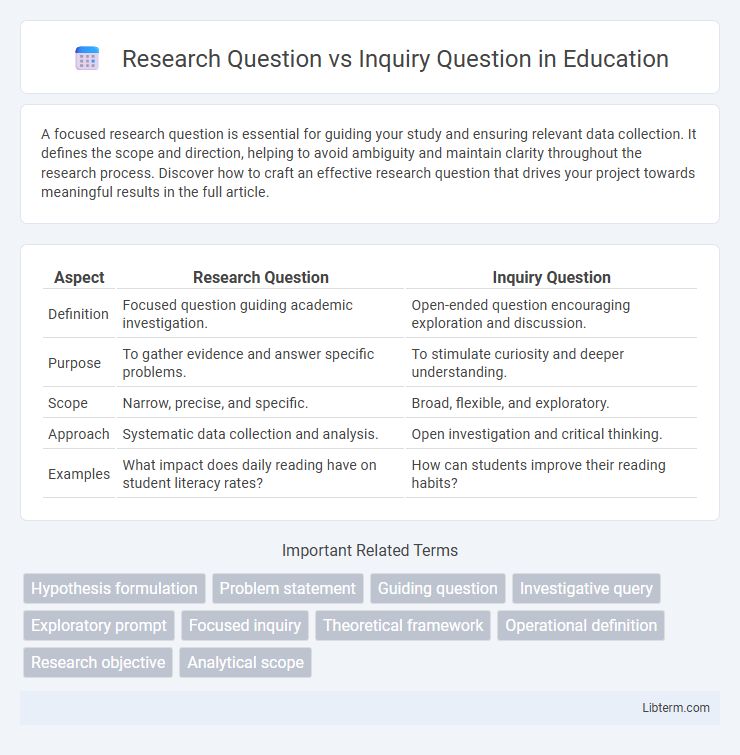A focused research question is essential for guiding your study and ensuring relevant data collection. It defines the scope and direction, helping to avoid ambiguity and maintain clarity throughout the research process. Discover how to craft an effective research question that drives your project towards meaningful results in the full article.
Table of Comparison
| Aspect | Research Question | Inquiry Question |
|---|---|---|
| Definition | Focused question guiding academic investigation. | Open-ended question encouraging exploration and discussion. |
| Purpose | To gather evidence and answer specific problems. | To stimulate curiosity and deeper understanding. |
| Scope | Narrow, precise, and specific. | Broad, flexible, and exploratory. |
| Approach | Systematic data collection and analysis. | Open investigation and critical thinking. |
| Examples | What impact does daily reading have on student literacy rates? | How can students improve their reading habits? |
Introduction to Research and Inquiry Questions
Research questions define the specific focus and objectives of a study, aiming to guide methodology and data collection with clarity and precision. Inquiry questions encourage open-ended exploration and critical thinking, fostering deeper understanding through investigation and reflection. Both types shape the foundation of academic research by directing inquiry and organizing the structure of knowledge acquisition.
Defining Research Questions
Research questions define the specific focus of a study by clearly identifying the problem or topic to be investigated, guiding the methodology and data collection processes. Inquiry questions are broader, designed to stimulate exploration and curiosity, often serving as a starting point for developing precise research questions. Effective research question formulation requires clarity, specificity, and feasibility to ensure it directs meaningful and manageable academic or scientific inquiry.
What are Inquiry Questions?
Inquiry questions are open-ended prompts designed to stimulate critical thinking and exploration in research or learning contexts. These questions guide investigations by encouraging deeper understanding, curiosity, and the development of new knowledge rather than seeking simple factual answers. Unlike research questions, inquiry questions often emphasize process and reflection, making them essential in educational settings to foster analytical skills and independent inquiry.
Key Differences Between Research and Inquiry Questions
Research questions aim to define specific objectives for systematic investigation, often targeting measurable outcomes within a particular discipline. Inquiry questions are broader, encouraging exploration and critical thinking to stimulate curiosity and open-ended discussion. The key difference lies in research questions being precise and hypothesis-driven, while inquiry questions foster inquiry and are more flexible in scope.
Purpose and Scope of Each Question Type
Research questions aim to precisely define the focus of a study by narrowing down the scope to specific variables or phenomena for systematic investigation. Inquiry questions are broader, encouraging exploration and curiosity, often guiding initial stages of learning or discovery across multiple perspectives. The purpose of research questions is to generate testable hypotheses or data-driven answers, while inquiry questions foster open-ended thinking and conceptual understanding.
Formulating Effective Research Questions
Formulating effective research questions involves distinguishing between research questions and inquiry questions, where research questions are specific, focused, and designed to guide systematic investigation, while inquiry questions are broader and exploratory. Effective research questions are clear, concise, and measurable, often addressing variables or phenomena to be analyzed. Emphasizing precision and feasibility enhances the ability to design research methodologies and produce valid, reliable results.
Crafting Engaging Inquiry Questions
Crafting engaging inquiry questions involves focusing on open-ended prompts that stimulate curiosity and critical thinking, unlike research questions that often seek specific answers. Inquiry questions encourage exploration and deeper understanding by inviting multiple perspectives and ongoing investigation. Effective inquiry questions are clear, focused, and relevant to learners' interests, fostering active engagement and meaningful dialogue.
Examples of Research and Inquiry Questions
Research questions often focus on specific, measurable aspects of a topic, such as "What is the impact of social media on adolescent mental health?" Inquiry questions tend to be broader and exploratory, for example, "How do adolescents perceive their mental health in relation to social media use?" Research questions guide systematic investigation and data collection, whereas inquiry questions encourage open-ended exploration and critical thinking.
Choosing the Right Question for Your Project
Selecting the right question for your project hinges on understanding the difference between research questions and inquiry questions. Research questions are specific, focused, and designed to guide systematic investigation aimed at generating measurable results, while inquiry questions are broader and encourage exploration and critical thinking. Aligning your project's objectives with either a targeted research question or a more open-ended inquiry question enhances clarity, direction, and the relevance of your findings.
Conclusion: Enhancing Academic Investigations
Research questions define the specific focus and guide the methodology of academic investigations, while inquiry questions foster broader exploration and critical thinking. Emphasizing clarity and precision in research questions enhances the reliability and validity of study outcomes. Strengthening inquiry questions encourages deeper analysis and innovative perspectives, ultimately enriching academic investigations.
Research Question Infographic

 libterm.com
libterm.com